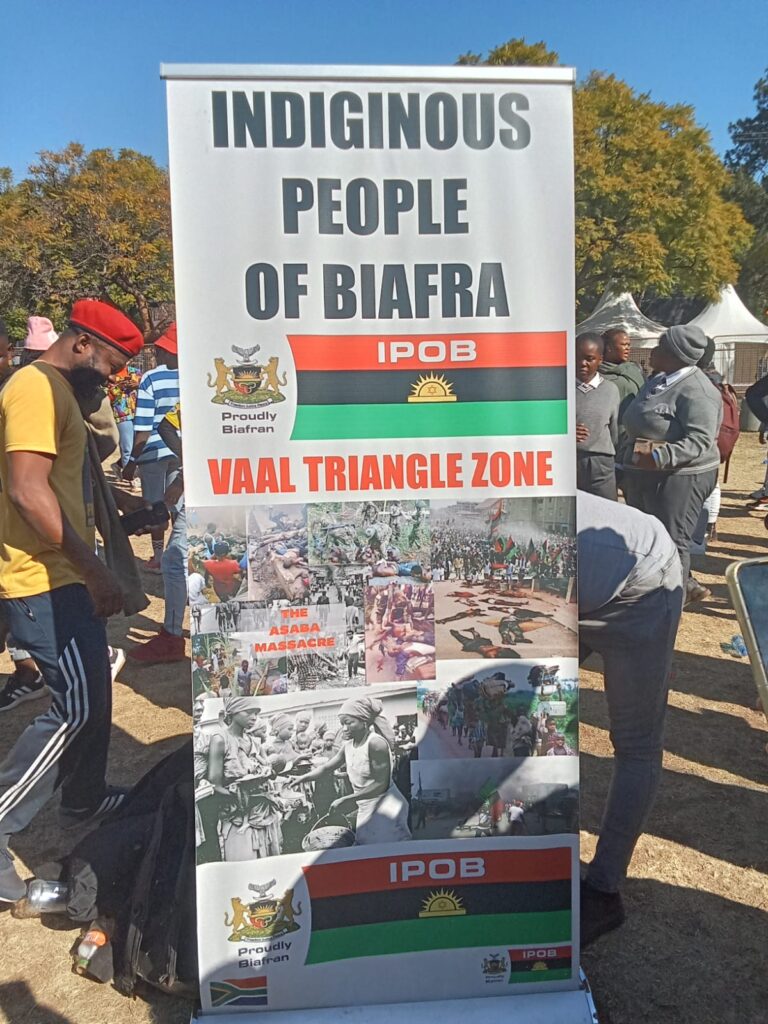
The Struggles of Emerging African Nations: A Case Study of Biafra
By Obuks baba for the Indigenous People of Biafra Johannesburg Zone
In the contemporary geopolitical landscape, the plight of emerging nations within Africa often languishes in the shadow of global indifference and selective attention.
Biafra, an occupied region in southeastern Nigeria, offers a poignant case study.
The history of Biafra, marked by its declaration of independence in 1967 and the ensuing genocide by the Nigerian authorities, underscores not just the existential struggle for self-determination but also the stark realities of geopolitical neglect and systemic genocide.
The Biafran Holocaust (dubiosly called the Nigerian Civil War), which raged from 1967 to 1970, resulted in the deaths of an estimated three million Biafrans, primarily due to starvation and disease.
This humanitarian catastrophe, despite its scale, garnered minimal sustained attention from global powers.
Today, the struggle continues with reports of systematic violence, marginalization, and human rights abuses against the Biafran people by the Nigerian government.
Yet, the international response remains tepid at best, raising critical questions about the reasons behind this persistent global apathy.
### The West and Global Powers: Selective Indifference
The reluctance of Western and global powers to intervene in or even acknowledge the plight of Biafra and similar regions in Africa can be attributed to several interrelated factors:
1. *Economic Interests and Realpolitik*: Western nations often prioritize economic interests and political stability over humanitarian concerns.
Nigeria, with its vast oil reserves, is a significant economic partner for many Western countries.
Disruptions in Nigeria’s political landscape could jeopardize these economic interests.
Thus, the West tends to support the status quo, even if it means turning a blind eye to human rights violations.
2. *Geopolitical Stability*: Global powers often view the secession of regions like Biafra as a threat to geopolitical stability.
The potential for widespread instability in an already volatile region can deter intervention.
The fear of setting a precedent that could encourage the rise of other Indigenous movements across Africa and beyond also plays a role in this strategic calculus.
3. *Media Attention and Public Awareness*: The plight of the Biafran people rarely captures the sustained media attention necessary to galvanize international action.
Media coverage of African conflicts is often sporadic and sensationalized, lacking the depth and continuity required to foster global awareness and empathy.
This media apathy results in a corresponding lack of public pressure on governments to act.
### The Continuous Genocide of the Biafran People
Despite the end of the civil war over five decades ago, the Biafran struggle is far from over.
Reports of extrajudicial killings, arbitrary arrests, and systemic marginalization persist.
The Indigenous People of Biafra (IPOB) led by Mazi Nnamdi Kanu, a movement advocating for Biafran independence, faces severe crackdowns from the Nigerian government.
The use of excessive force, torture, and intimidation against Biafran activists and civilians underscores a continuous pattern of state-sanctioned violence that borders on genocide.
The international community’s failure to address these ongoing atrocities reflects a broader trend of ignoring human rights abuses in regions deemed politically or economically inconvenient.
The lack of robust international mechanisms to hold perpetrators accountable further exacerbates the situation, allowing the cycle of violence and oppression to continue unabated.
### A Path Forward: Global Responsibility and Action
To address the plight of Biafra and similar struggles across Africa, a multifaceted approach is necessary:
1. *Increased International Awareness and Advocacy*: Media organizations, non-governmental organizations (NGOs), and human rights advocates must prioritize sustained coverage and advocacy for the Biafran cause.
Highlighting the human stories and systemic abuses can generate the public awareness needed to pressure governments and international bodies into action.
2. *Diplomatic Pressure and Sanctions*: Western nations and global powers should leverage diplomatic channels to pressure the Nigerian government to cease human rights abuses against the Biafran people.
Targeted sanctions against individuals and entities responsible for these violations can serve as a deterrent and signal a commitment to upholding human rights.
3. *Support for Self-Determination*: The international community must acknowledge and support the legitimate aspirations of peoples seeking self-determination.
This does not necessarily mean endorsing secession but rather facilitating dialogue, ensuring fair political representation, and addressing grievances that fuel separatist movements.
4. *Strengthening International Institutions*: Global institutions like the United Nations must be empowered to respond more effectively to internal conflicts and human rights abuses.
This includes reforming mechanisms for intervention, enhancing peacekeeping capabilities, and ensuring accountability for violations.
### Conclusion
The struggle of the Biafran people is emblematic of broader challenges faced by emerging nations across Africa. Global powers must transcend their economic and political interests to uphold the principles of human rights and self-determination.
By increasing awareness, applying diplomatic pressure, supporting legitimate aspirations, and strengthening international institutions, the world can take meaningful steps towards addressing the plight of Biafra and fostering a more just and equitable global order.
The cost of inaction is not just the continued suffering of millions but the erosion of the moral foundation upon which the international community stands.
Tshwane Talks readers have been able to read stories in this publication for free for over two years now. We still want our readers to access our stories for free, but we are asking those among our readers who can afford it to contribute at least R30 a month to cover some of the costs of publishing this independent, non-aligned online newspaper which gives a voice to all sectors of society irrespective of race, colour, creed, religion, or political affiliation. You may make your contribution by depositing at least R30 a month into Tshwane Talks' bank account. Details are as follows:
Bank Details
Bank: Standard Bank
Account Number: 10225548834
Account Type: Cheque Account